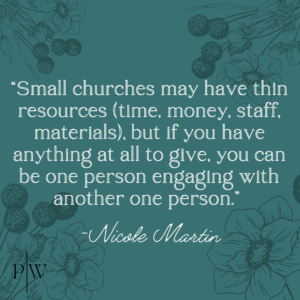Better Together: The Encouragement of Ministry Networks
I recently realized that I love serving in a church that’s connected to a denomination! Growing up I knew little more than the name of my church’s denomination, and, although I was very involved, I was just in high school. Even when we entered vocational ministry 8 years ago, I never guessed that I would enthusiastically say that I liked being part of a church conference. Take your pick of why a local church might practically benefit from associating with a denomination or similar network: the policy structure, pay scale suggestions, and the common statement of faith are some examples. However, I don’t love our church conference because of the possible pragmatic perks for a small church like ours. The benefits are less to do with finance books and resources and more to do with friends and reciprocal relationships. The encouragement that comes from connecting in ministry is the best!
I can empathize with those who are wary of this romantic idea. Even an institution with a band of Christians working together falls short of God’s glory. Our current church actually switched denominations a few years after we arrived, in large part due to theological drift. Another downside was we were 18+ hours away from the hub where the office and meetings and most churches were located. As you can guess, our interactions were few. On the contrary, our new conference had theology we stood behind and a district minister for our area. Then there was this foreign, mystical thing called a pastors’ wives retreat. Yes, I still had to drive 4 hours to get there, but I’m so glad my cousin (who was a pastor’s wife in the same denomination) convinced me to go with her. It took courage at the start to learn new names and interact with women who seemed so put-together. At the same time my husband was meeting men at formal and informal connections. The first time we went to a district function together neither of us felt like our spouse was “bringing us along.” We both feel like part of the family! As I’ve gotten to know our co-labourers, it’s been less intimidating and more life-giving all around. I’ve listened to their journey in foster care and prayed for them, slept in their basements with my husband and kids, and we’ve escaped a “locked” castle together (the one-hour cooperative kind). There’s been lots of potential for friendship, accountability, and motivation.
A few years ago, the national director of our conference and his wife, Laura, sought us out and stopped in to see my husband and me during their personal road trip. We ate my strawberry tarts and prayed together in our little church library that doubles as a conference room. I hadn’t even remembered this one hour event until Laura reminded me of it recently. She recalled how encouraging it was for her! That made me smile because I can underestimate how I can encourage, even when someone else had set out to encourage me.
So, my positive experience is one thing, but I started thinking: “Are there Scripture passages to support this idea of church conferences?” I remembered the exhortation in Hebrews 10:25 to “stir up one another…not neglecting to meet together, as is the habit of some, but encouraging one another.” I understand this passage to address a group of Christians in one place—a local church. Obviously local fellowship is crucial as this verse is saying, but it’s a different idea than associating with a broader group of like-minded churches that span locations. So, I asked a smart friend if they had any ideas. (Okay, it was actually my husband, but he is smart and he was also very accessible at the time.) Faster than an internet search, he pointed me to a famous leader of the ancient church—Paul. In Paul’s letter to the Romans, he describes his longing to go to Rome to be with the believers there. He writes, “For I long to see you, that I may impart to you some spiritual gifts to strengthen you—that is, that we may be mutually encouraged by each other’s faith, both yours and mine” (Romans 1:11-12). Reading these verses made me think that Paul was like the first “director” or “district coach,” so to speak. Paul did not plant the church in Rome, but he cared about the strengthening of the Church there. He believed that the Roman church’s faith would encourage him and, in turn, he could encourage them.
I heard a presentation on a new research study called Significant Church: Understanding the Value of the Small Evangelical Church in Canada. Its aim was to understand the needs of Canadian Evangelical small churches in order to care for them. (To download the entire report released January 2023 visit the Evangelical Fellowship of Canada’s website. https://www.evangelicalfellowship.ca/Communications/Research/Significant-Church-Small-Church-Research-Study.) My ears perked up during this report because I was agreeing with the interviewees and the study’s conclusions. It’s always reassuring to know you aren’t the crazy one out in the left cornfield, or, at least, you aren’t alone out there. One of the findings from surveying Canadian small church pastors and interviewing ministry experts was the importance of ministry networks (of which “denominations” was the most common network example). Networking can be particularly difficult when separation and/or differences in geography, subculture, and gender (ie: women in ministry) “impedes access to networks,” something they dubbed network distance (Significant Church, 2023, pg. 12). I think we’ve all experienced, in varying degrees, the isolation of ministry and the inaccessibility of a support system that we desperately need. I also know that the pastor’s wife has very little say in what denomination or fellowship her church is in. But, if Significant Church recognized that “accessible networks for pastoral peers were seen as important resources” (pg. 12), how do we tap into those we do have within our reach?
Significant Church* thought it was worth saying that “ministry networks are best understood as networks of individuals, not organizations” (pg. 134). Official denominational involvement feels overwhelming (and boring?), but hope is sparked in me to hear it verbalized that true connection is primarily between people (like the pastor and a conference leader), not entities (like the local church and the denomination). Little me and you are valuable because it’s not just about gaining from or giving to the denomination office. Instead our unity in Jesus provides stability for us to branch out towards others in connection. So, when you think about your official networks, think of the individuals with whom you can have a mutually encouraging relationship. Small churches may have thin resources (time, money, staff, materials), but if you have anything at all to give, you can be one person engaging with another one person.
If you and your spouse want to strengthen the relationship with your church association(s), put yourself in situations where you can know the people. Maybe there’s a gathering you can make a priority this year by adding it to your calendar and budget (church or personal).
Be the person you need for someone else. Invite another pastor’s wife to participate and meet the people you don’t know. Join the zoom call, send the email, and mail the family Christmas card to keep in touch when you can’t be together in person. Remember the goal isn’t to connect an institution to another institution or even an individual to an institution. It’s to connect an individual to an individual.
Our conference’s slogan is Better Together. The Apostle Paul seemed to agree. We are truly better together.

*Significant Church: Understanding the Value of the Small Evangelical Church in Canada, by Rick Hiemstra and Lindsay Callaway. Faith Today Publications, 2023.


Thanks so much for this Nicole. I heartily agree.
As a small town pastors wife, I have chosen to prioritize attending events on denominational levels with my husband.
This has been very difficult to do, particularly when kids were young and this required finding childcare. In hindsight, now that my kids are older with several moved out of the home I believe this was one of the best things I chose to do as a pastors wife. It allowed me to support my husband and see a greater vision for ministry with denominational goals that I could understand and be a part of, but it also allowed me to make connections outside of my rural life which was important during seasons when I struggled in ministry.
I just wanted to type this to encourage any other pastor wives who might be in the same situation…. Reach out to your denomination and you will find that other pastors wives might need to retreat with you, you might be the encouragement that they need… Or you may find yourself in the position where you need to receive from them.
It is harder and harder for us to make these retreats and denominational meetings are priority in ministry… But the blessings abound when we do.
I appreciate all of these emails, for the encouragement that they bring. THANK YOU.
We’re so glad you are encouraged, Connie! That’s why we are here at Flowers–to encourage, equip, and connect you as a pastor’s wife. Let us know if there is anything more we can do to encourage you by emailing us at [email protected].